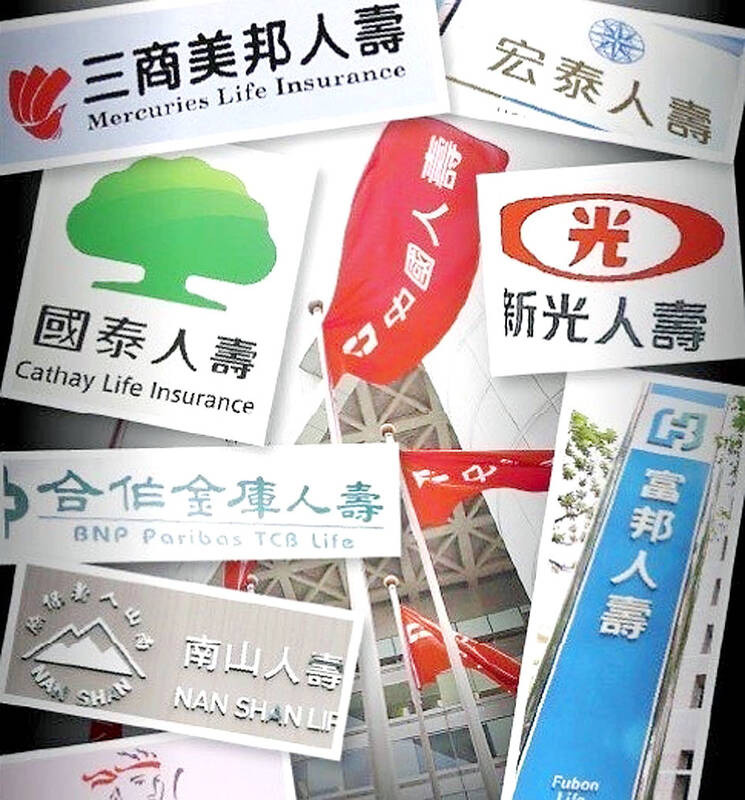Domestic life insurance companies now have more financial leeway for property investments, as the required minimum yield on real-estate investments have been cut from 2.97 percent to 2.419 percent, effective on Tuesday, the Financial Supervisory Commission (FSC) said.
The deregulatory revisions came after local insurance companies complained the previous requirement made investment in real estate impossible in light of soaring commercial property prices across Taiwan.
The FSC agreed to lower the threshold in October last year, but the new formula needed to go through a 60-day public notice period before going into practice, it said.

Photo: Taipei Times
Local life insurers used to be the main players in Taiwan’s commercial property market, but stayed on the sidelines in recent years after the central bank raised interest rates five times to tame inflation and indirectly drove up the minimum yield for real estate investment to 2.97 percent.
The commission arrived at the old formula by taking cues from interest rates on the post office’s two-year time deposits plus a premium of 125 basis points.
Now the commission keeps the premium of 125 basis points but uses the average interest rates of the post office’s two-year time deposits for the past five years, effectively muting the impact of rate hikes in 2022 and 2023.
The revision brings down the yield requirement by 55 basis points to 2.419 percent, the commission said.
The relaxation is intended to mitigate pains induced by short-term interest rate changes for life insurers, it said.
Life insurers need to utilize idle money to stay financially healthy and cover assorted claims from policyholders, it added.
Commercial properties proved attractive investment targets in recent years on strong office demand from technology and financial firms, analysts said, adding that there has been a lack of new office space in Taipei’s central business districts.
Rather, life insurers shifted their focus to logistics and warehousing facilities as well as industrial land plots, and collected rent incomes of 3 percent to 5 percent.
The easing would provide much-needed funds into the commercial property market that observed 7 percent decline last year, according to property broker CBRE Ltd Taiwan (世邦魏理仕台灣).

Intel Corp chief executive officer Lip-Bu Tan (陳立武) is expected to meet with Taiwanese suppliers next month in conjunction with the opening of the Computex Taipei trade show, supply chain sources said on Monday. The visit, the first for Tan to Taiwan since assuming his new post last month, would be aimed at enhancing Intel’s ties with suppliers in Taiwan as he attempts to help turn around the struggling US chipmaker, the sources said. Tan is to hold a banquet to celebrate Intel’s 40-year presence in Taiwan before Computex opens on May 20 and invite dozens of Taiwanese suppliers to exchange views

Application-specific integrated circuit designer Faraday Technology Corp (智原) yesterday said that although revenue this quarter would decline 30 percent from last quarter, it retained its full-year forecast of revenue growth of 100 percent. The company attributed the quarterly drop to a slowdown in customers’ production of chips using Faraday’s advanced packaging technology. The company is still confident about its revenue growth this year, given its strong “design-win” — or the projects it won to help customers design their chips, Faraday president Steve Wang (王國雍) told an online earnings conference. “The design-win this year is better than we expected. We believe we will win

Chizuko Kimura has become the first female sushi chef in the world to win a Michelin star, fulfilling a promise she made to her dying husband to continue his legacy. The 54-year-old Japanese chef regained the Michelin star her late husband, Shunei Kimura, won three years ago for their Sushi Shunei restaurant in Paris. For Shunei Kimura, the star was a dream come true. However, the joy was short-lived. He died from cancer just three months later in June 2022. He was 65. The following year, the restaurant in the heart of Montmartre lost its star rating. Chizuko Kimura insisted that the new star is still down

While China’s leaders use their economic and political might to fight US President Donald Trump’s trade war “to the end,” its army of social media soldiers are embarking on a more humorous campaign online. Trump’s tariff blitz has seen Washington and Beijing impose eye-watering duties on imports from the other, fanning a standoff between the economic superpowers that has sparked global recession fears and sent markets into a tailspin. Trump says his policy is a response to years of being “ripped off” by other countries and aims to bring manufacturing to the US, forcing companies to employ US workers. However, China’s online warriors